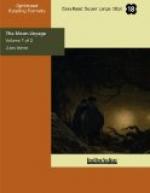“You are certain of your figures?” asked Barbicane.
“Absolutely certain,” answered the major. “The Armstrong cannon only uses 75 lbs. of powder for a projectile of 800 lbs., and the Rodman Columbiad only expends 160 lbs. of powder to send its half-ton bullet six miles. These facts cannot be doubted, for I found them myself in the reports of the Committee of Artillery.”
“That is certain,” answered the general.
“Well,” resumed the major, “the conclusion to be drawn from these figures is that the quantity of powder does not augment with the weight of the shot; in fact, if a shot of 24 lbs. took 16 lbs. of powder, and, in other terms, if in ordinary cannons a quantity of powder weighing two-thirds of the weight of the projectile is used, this proportion is not always necessary. Calculate, and you will see that for the shot of half a ton weight, instead of 333 lbs. of powder, this quantity has been reduced to 116 lbs. only.
“What are you driving at?” asked the president.
“The extreme of your theory, my dear major,” said J.T. Maston, “would bring you to having no powder at all, provided your shot were sufficiently heavy.”
“Friend Maston will have his joke even in the most serious things,” replied the major; “but he need not be uneasy; I shall soon propose a quantity of powder that will satisfy him. Only I wish to have it understood that during the war, and for the largest guns, the weight of the powder was reduced, after experience, to a tenth of the weight of the shot.”
“Nothing is more exact,” said Morgan; “but, before deciding the quantity of powder necessary to give the impulsion, I think it would be well to agree upon its nature.”
“We shall use a large-grained powder,” answered the major; “its deflagration is the most rapid.”
“No doubt,” replied Morgan; “but it is very brittle, and ends by damaging the chamber of the gun.”
“Certainly; but what would be bad for a gun destined for long service would not be so for our Columbiad. We run no danger of explosion, and the powder must immediately take fire to make its mechanical effect complete.”
“We might make several touchholes,” said J.T. Maston, “so as to set fire to it in several places at the same time.”
“No doubt,” answered Elphinstone, “but that would make the working of it more difficult. I therefore come back to my large-grained powder that removes these difficulties.”
“So be it,” answered the general.
“To load his Columbiad,” resumed the major, “Rodman used a powder in grains as large as chestnuts, made of willow charcoal, simply rarefied in cast-iron pans. This powder was hard and shining, left no stain on the hands, contained a great proportion of hydrogen and oxygen, deflagrated instantaneously, and, though very brittle, did not much damage the mouthpiece.”
“Well, it seems to me,” answered J.T. Maston, “that we have nothing to hesitate about, and that our choice is made.”




